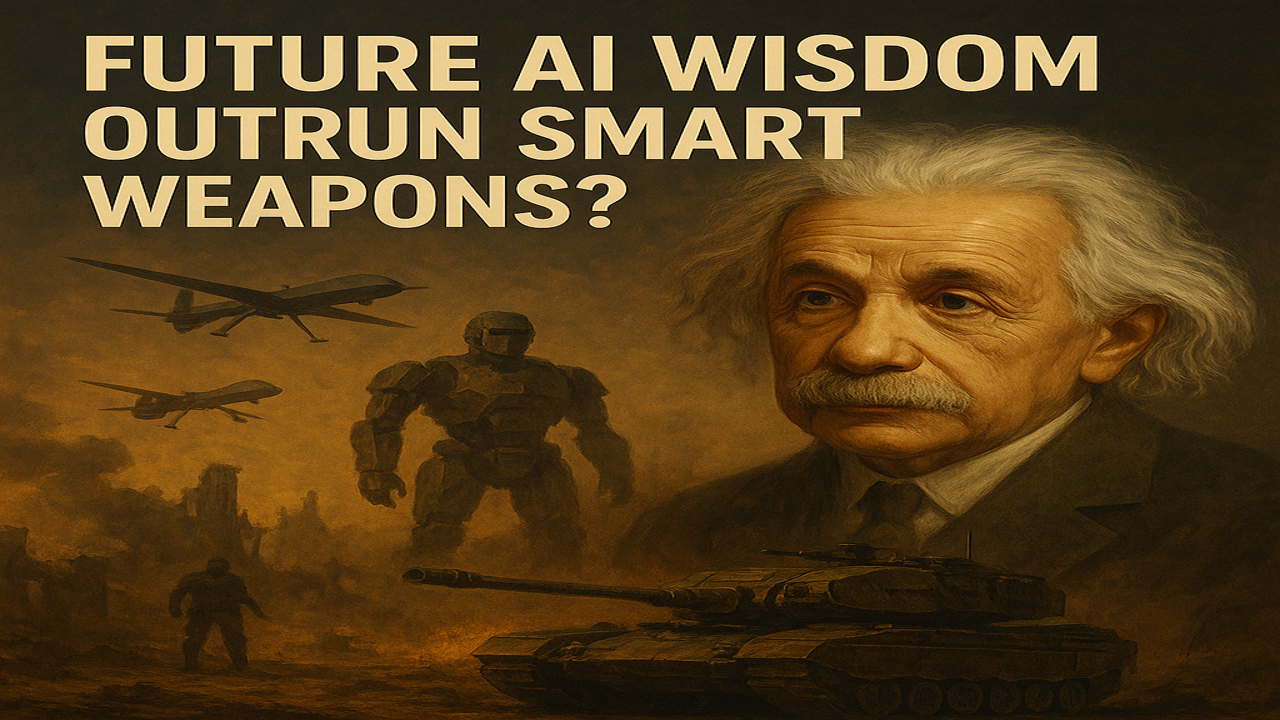Imagine a world where wars are fought not by humans, but by AI-powered machines making decisions in real-time — choosing who lives, who dies, and how long a conflict should last. No hesitation. No empathy. Just cold, calculated logic.
Would Einstein — the man who revolutionized physics and warned against nuclear warfare — have seen this coming? And more importantly, would he have been able to stop it?
In this article, we dive into a future where Artificial Intelligence controls the battlefield, and explore which countries are leading this charge, what tools will be used, and whether human values will still matter in a world ruled by machine wars.
The AI Battlefield: Beyond Science Fiction
AI has evolved from being a helpful assistant to becoming a potential autonomous war strategist. As of now, most military AI is used for surveillance, data analysis, and cyber security. But the future holds something far more dangerous — machines with full combat autonomy.
Here’s how the face of war is changing:
AI Weapons of the Future: Tools That May Decide Humanity’s Fate
1. Autonomous Drones & Swarm Warfare
- These are intelligent flying machines that don’t just follow instructions but make real-time decisions.
- Future drone swarms — hundreds flying in sync — will act like AI-driven “hunting packs.”
- Already used in conflicts by Turkey, Israel, and the US, but future models will be smarter, deadlier, and impossible to track.
2. Robotic Ground Units
- AI-powered robotic tanks and four-legged robots (like Boston Dynamics’ “Spot”) are being deployed for surveillance and targeted attacks.
- Russia’s Uran-9 and China’s robotic systems are early versions of what may one day replace human infantry.
3. AI Cyber Warriors
- AI tools capable of launching self-adaptive cyber attacks that evolve as they breach enemy firewalls.
- They don’t just disable weapons — they can hijack systems, change coordinates, and trigger fake alerts.
- AI-based malware could target nuclear sites or defense satellites.
4. AI Command Centers
- Imagine a war room where all decisions are made by algorithms — analyzing satellite data, battlefield movements, supply chains, and even enemy psychology.
- America’s Project Maven is already doing this using deep learning and video analysis.
5. AI-Guided Hypersonic Missiles
- Missiles that travel 5x faster than sound — and change direction mid-air using real-time AI input — are being tested by Russia and China.
- Human reaction time is no match.
Who’s Building the AI War Machines?
🇺🇸 United States
- Projects like JAIC and DARPA lead AI military development.
- Silicon Valley giants like Google, Palantir, and OpenAI partner with the Pentagon.
- US also leads in satellite-powered AI coordination and unmanned combat air vehicles.
🇨🇳 China
- Declared AI supremacy as a national goal by 2030.
- Uses tech from Huawei, Baidu, and Tencent for surveillance, war strategy, and drone control.
- Has the world’s largest database of facial recognition and behavioral analytics.
🇷🇺 Russia
- Strong in AI cyberwarfare, digital espionage, and robotic weapon systems.
- In Ukraine, Russia used AI-guided drones and digital jamming devices.
- Lacks the compute power of the West but makes up with unpredictability.
🇮🇱 Israel
- Pioneers in precision AI strikes and drone development.
- Iron Dome missile defense uses AI to intercept threats in seconds.
- Dozens of AI-focused defense startups make Israel an innovation hub.
🇹🇷 Turkey
- Gained global attention with its Bayraktar TB2 drones.
- Combines AI targeting systems with cost-effective autonomous weapons.
- Emerging as a drone-exporting power.
Einstein’s Warning Reimagined for the AI Era
Einstein’s theories helped create the atomic bomb, a weapon he later deeply regretted. He believed technology without ethical control was dangerous. If he were alive today, AI weapons would probably horrify him more than nuclear ones.
Why?
Because AI wars won’t need a red button or a general’s command. The algorithm decides.
And that’s the terrifying part.
Who decides what is ethical when machines are at war?
What if a facial recognition algorithm misidentifies a civilian as a combatant?
Who’s to blame — the soldier, the developer, or the AI itself?
Einstein once said,
“It has become appallingly obvious that our technology has exceeded our humanity.”
In the age of AI wars, that might finally be true.
Who Has the Upper Hand in Future AI Wars?
| Factor | Leading Country | Why? |
|---|---|---|
| AI Talent & Research | USA | MIT, Stanford, Silicon Valley |
| Data Access | China | State-controlled surveillance |
| Combat Testing | Russia, Israel | Real-time battlefield use |
| Cyber Offense | Russia | High-level hacking tools |
| Drone Leadership | USA, Turkey, Israel | Advanced and exported tech |
| Innovation Speed | China | Rapid state-funded projects |
The Human Question: Can We Still Control What We’ve Created?
The bigger question isn’t about weapons or power. It’s about control.
Can humanity retain its grip over AI weapons?
Or will we, like Einstein feared, create something we can’t undo?
Unless global powers unite to regulate autonomous weapons, the future might not be shaped by strategy — but by the fastest, most brutal AI.
